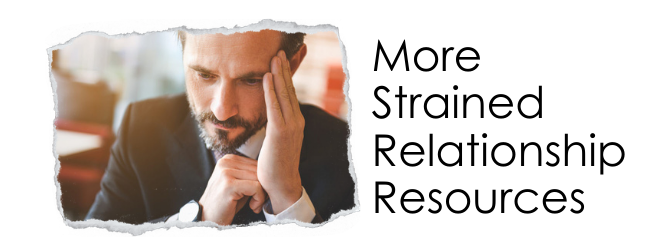Post pandemic updates:
The world has truly changed since the pandemic. Not only health, but mental health has come to the forefront. Some of these issues are curable, heal-able or fixable. Others, everyone is hopefully learning to manage through self-care and other mitigations. Some mitigations are small changes or shifts, and others are more dramatic, even drastic adjustments.

Difficult relationships can zap your energy, cause self-doubt or bring out negative behavior. It’s important to focus on taking care of yourself. Having outside support makes this easier.
When these health or mental health concerns are your own, you have more control. You get to decide. To choose. To act. Very often, however, such concerns may be experienced or created by someone close to you at home or work. Especially when it’s family members or very close friends, it’s not possible to exit. That’s where feeling stuck comes in. Let’s unpack the topic. Hopefully it will be of help.
This article is divided into the following sections:
- Introduction and Resources
- Facing Challenging Relationships
- Example Situations
- 9 Tips to Help When You Live With Difficult People or Have Challenging Situations in Your Life
When You Feel Stuck—Or Choose to Remain—In A Difficult Relationship With Someone Who Will Not, May Not, or Cannot Change
The Pandemic has brought out the best and the worst in relationships. While there are no data on the numbers of people in difficult or disastrous relationships as yet, we do know that large numbers are struggling—be it in a relationship with a mate, a child, or an older parent. Maybe even an employer or coworker with work-from-home (WFH) arrangements sometimes being unstable.
My background has been working with people on the continuum of relationships. On one end of the continuum are those struggling all the way to people who call on me to ensure continued success or to make a good relationship even better. My goal is always to give people the confidence, tools, and skills to come together so they achieve their dreams, goals, and objectives personally and professionally. Sometimes it’s not possible, so we partner to help some uncouple in as healthy a manner as possible. Some need to let go of difficult choices and rework agreements. Some just need to exit with support.
As the data emerges I will share what I’m learning in the coming months as we wend our way through “these unprecedented times.” In the meantime, relationships are relationships. Yes, the pandemic, lockdown, emerging and returning to work and social activities do magnify and sometimes create crises. Hopefully, they also make you reflect on what needs to be addressed in your relationships. I’ll continue to share free resources and articles and posts which I hope will be helpful. Three things to note about our resources and services:
- Please reach out for support and a complimentary Discovery Conversation so together we might find the steps for the changes you are facing. Contact me here.
When Faced With Challenging Relationships

When your relationships are challenging focus on what you value and what you can control which is your mindset, your behavior and how you choose to respond. Seek help to stay aligned and prioritize self-care.
You’re struggling in a relationship with someone in your life. It’s a relationship you cannot or wouldn’t want to just walk away from. It may be a relationship with your mate, an ex, or someone you’re dating; It may be your child, stepchild, or teenager; It may be a boss, business partner, or colleague. Challenges in relationships are common in life but when the difficulties persist for a long period of time they take a toll on your energy and inner resources. To put it mildly – these relationships are draining.
Even the most highly conscious, successful, spiritually aware, competent, and resourceful people experience the turmoil, emotional cost, and often helplessness that a difficult relationship can bring, especially when it’s with someone you know or suspect will not, may not, or cannot change.
Some highly competent people “tough it out” and ignore the toll it is taking on them. Some constantly look where they’ve gone wrong, redirecting the focus on themselves. Others wish they could run or walk away. They may shut down internally instead—going through the motions, but gradually numbing to themselves and others.
What’s a person to do? While there are no easy answers to difficult relationships or difficult patches in relationships, I do know that how you choose to handle the challenge will make all the difference in the world for your sense of
Physical, mental, emotional and spiritual health
Mastery in this and all your relationships
Self-respect and dignity in how you treat yourself and others
Grappling with your mindset about your situation, resolving that you only have control over your behavior and not the other person, and committing to interact with grace and dignity are the recommended path. Let’s explore this further and look at some options to help you achieve this outcome.

Difficult relationships can come in many forms, personally or professionally When it’s family or close friends it can be hard to create boundaries.
Maybe you’re in a situation similar to any one of my clients:
- Carolyn is a 58 year-old, soft-spoken yet highly influential Project Manager at a major international corporation. 41 year-old Sarah, is a successful strategic business planner for start-up companies. Each has worked for extensive periods of time, reporting to actively mean, controlling, narcissistic bosses. Erica is a 32 year-old in-house lawyer with an immature and narcissistic female colleague who harasses her almost daily.
- In their late 30’s, two couples, Don and Clare, Mark and Judy are in constant tension. Each couple wants to pursue divorce but the economic times make it nearly impossible to proceed with any speed. They can barely communicate yet must interact because they each love their school-age children and wish to spare them as much of the wrenching adult difficulties as possible. It’s a continuous struggle of wills.
- Thoroughly loving and committed to their wives and families, Doug, Jeff, and Mike, are men between 36-52 years of age. Each is feeling gradually more and more dissatisfied and lonely in their primary relationship. They desire more, but their wives seem content. Their wives either do not hear their concerns or actively resist change. Mike’s wife refuses to go to coaching, a marriage class or to therapy.
- Darcy, married for 5 years is the step mom of two apathetic teens. Her husband feels guilt when she brings up her frustrations so they cannot discuss how to make things better. His ex makes both their lives as difficult as she can. He feels caught in the middle, not knowing what to do, so nothing changes.
- Going through difficult divorces, Joe has a 15 year-old daughter who is angry and won’t talk to him and John has a 16 year-old son he hasn’t seen in the past 9 months. Both have exes who make no effort to help the fathers and their children reconcile. It will take much legal negotiation and potentially therapy, to help resolve their relationships with their kids.
- Clare, Mary, and Kirsten, all in their mid-late 30’s are successful in their careers—but not feeling so lucky in love. Each was in love with a good guy who seemingly strung them along in a relationship and ultimately failed to commit. This has happened repeatedly to each of these women. They are recovering from heartache and reassessing their dreams; Unsure if they should give up or what to do differently. Each is trying to move on, but with grave self-doubt and sadness.
- Mark, also in his late 30’s is a highly skilled engineer in charge of top-level projects for his company. He provides humor, expertise and leadership that make his staff and clients loyal to him. His boss takes him for granted and he is grossly undervalued with no talk of things improving. He’s experiencing similar feelings on the home front.
- Jessica is the mother of a brilliant, highly-educated 29 year-old son who experienced a severe emotional breakdown and has never been the same. She feels she’s lost her son though he lives with she and her husband due to his disability. Jessica’s husband is shut down and unable to grieve with her.
- Arnold and his 39 year-old sons, Carrie and her husband, Dan, Traci and her brother Bob, each run family businesses together. It’s stressful. Balancing personal and professional lives are just one level of relating that contributes to periodic, if not daily tension.
- Jake has a disabled sister living with him who requires much care. It’s wearing him out. Matt and Sue’s 11 year-old daughter Amber, diagnosed with ADHD is defiant and belligerent. She frequently disrupts the family life leading Matt and Sue to bicker. Harriet and Pete have teenagers and are caring for one parent going through cancer treatment and another with Alzheimer’s. Keeping it all together is wearing.
You may also be similar in what you say to yourself about your situation:
“I don’t want to rock the boat. Look at all I’ve got. Good Kids, A nice house, few money problems. My wife takes care of so many things. I shouldn’t be complaining. But I feel lonely. All of her attention goes to raising the kids – and it should because they are young – but I don’t feel connected anymore. I worry what we’ll be like once the kids are grown.”
“I’m stuck. I got myself into this – at home and at the office. It’s just the way it is. My boss isn’t going to change and my wife doesn’t listen to my frustration.”
“What’s wrong with me? Why didn’t I see this coming sooner? Am I ever going to find a guy who will go forward with me? I must be doing something wrong.
“How do I get through this? Do I have to leave even though I love my job (or my wife, or my family?)? Or, I cannot afford to quit? How do I preserve my sanity? I hate to get up in the morning, yet I love my co-workers and the actual work.”
Relationship struggles come in all shapes and sizes. It doesn’t matter how large or small the struggle; relationship conflicts drain your energy. They cause painful feelings of sadness, frustration, or anger. They can lead to self-doubt, hopelessness, and even depression. While one response to a difficult relationship maybe just to walk away, this is not always feasible, nor is it always advisable or possible. You can’t walk away from a child or a family member. You don’t always walk away from marriage just because you go through some loneliness. You may love your job and/or need the income. You may love your wife or husband and your kids.
You are struggling both on a day-to-day level, and your higher self is seeking greater consciousness, spiritual awareness, and to become stronger, more competent, and more resourceful in all aspects of your life, even in your most difficult relationships. You don’t want to walk away from this challenge; you want to grow from this experience. And, you want to feel better and less stressed!
9 Tips to Help When You Live With Difficult People or Have Challenging Situations In Your Life

Difficult relationships can zap your energy, cause self-doubt or bring out negative behavior. It’s important to focus on taking care of yourself. Having outside support makes this easier.
- Face The Facts – With Wise Guidance: Getting outside, objective counsel or coaching can be very helpful to put things in perspective. You need help to see just how stressful or difficult a situation really is—not for the purpose of wallowing in self-pity—but rather to come face-to-face with the need for change. That person can help you process your pain or anger and then also point you in the right direction or give you the nudge you need to make wise choices for yourself and those around you. Healthy friends can then keep you focused on continuing to change your part in the relationship equation.
- Increase Self-Care and Set Limits: I cannot stress this tip enough and you probably neglect this one first! You must do things for yourself and you must make choices about what you will and won’t, can and can’t do when you are in a difficult relationship. Often we lose perspective, so again, this is time for outside counsel from a coach or counselor, and ongoing support from good friends. Limit setting can include delegating tasks to others depending on the relationship in question. If you are caring for the elderly or sick you can involve your siblings, and family members or hire an advocate for example. Many times people overdo, so self-care and limit setting can mean stopping certain behaviors you do for or with the person in question if they do not value what you are doing (unless it is a job requirement.) For example: Stop doing laundry for a belligerent ungrateful teenager. Make only one dinnertime meal if no one is appreciating the varieties you provide. Stop obsessive emailing to a soon-to-be ex-spouse who inundates you with email criticism; respond only to the basics of scheduling necessities for your children, house, or financial maintenance.
- Have a Guiding Mantra: When seeking guidance it’s important to seek someone who can help you evaluate and focus on your values and life priorities as well as your stresses and obligations. It’s important to have both a perspective of the Daily Details or struggles, as well as what I call The Big Picture. You know that no relationship is perfect. Because of this, the choices you make must be your choices. A wise coach or counselor can give you objective feedback on what is typical in similar situations, or provide you insight into ways to make what I call “healthy, normal, adult choices” so you can behave with “grace and dignity.” That’s a helpful mantra to keep top of mind.
- Feel Sorry For Yourself (but limit the time:) Sometimes you don’t know why you are in a particularly tough situation or why you’ve been dealt such a tough row to hoe. It’s okay to feel sorry for yourself or feel bad for a bit. That honors your feelings. But feelings shouldn’t run the show. Give that little girl or little boy inside 5 or 15 or 30 minutes to mope or cry or tantrum. But don’t wallow in being a victim. Ask your friends for 10 minutes to just get it off your chest. Then refocus your attention on learning everything you can from the situation you are in and changing your responses and behavior. You want to feel proud of yourself not sorry for yourself. Such a stance will help you take appropriate action steps when you are ready and make wise decisions about the outcome you desire.
- Stop All Negative Talk About Yourself or Others: Negative talk and thoughts breed more negativity. It will just make you and those around you feel worse. Focus on what’s real and then what you are willing to do to make it better for yourself and others. For example, there’s nothing worse than an office where everyone is gossiping and the morale is lowered by the continuous negativity or a family where everyone speaks with irritation about one another.
- Stand Still – Work on Yourself: No matter what your situation, you always have a choice to stay or go, to be actively involved or to numb out. I encourage my clients to assess and do whatever it takes to feel proud of themselves. You may not be able to change another person, but you can behave with “grace and dignity.” You can be a great worker or a good co-worker; you can keep your heart open in case your mate or your kids or step kids turn around. I’m not saying you should be a doormat or put up with any form of abuse or let others overstep their bounds. I’m saying focus on your responses and how you can change them. Focus on your behaviors and alter them if they are not healthy for you or if they make you not proud of yourself. If you can’t think of what a “healthy, normal adult would or could do” in the situation that’s where you turn for some outside guidance.
- Stay Connected: One of the most difficult things is to stay connected to another human being when a relationship is difficult or conflicted. Yet it’s one of the greatest lessons in life to stay connected to a bratty child, a mate who’s taking us for granted, a boss, colleague, family member, or friend who “see” us or who doesn’t value our contribution fully. Staying connected means staying present to yourself rather than reverting to the negative tapes, the stories you create that are running through your head. It means acting on your life dreams and desires (even if only in small ways) so YOU stay ALIVE to your SELF and your creative energies. It means staying present to the verbal, emotional, and behavioral changes that make you feel better and that, in some instances, will actually create change in the relationship.
- Be Open to Change: Sure, if you need to look for another job, please do. If a relationship with your date or mate becomes unbearable even in the face of your change, then you may consider leaving. Continue to pursue your divorce if you need to. However, as you make clear choices, set appropriate limits, feel stronger and better about yourself, you may notice that the difficult people around you also respond differently. You’ve got the idea: For example, if you chose not to think negative, angry thoughts about your teen or boss or mate, they could potentially feel more accepted and begin to respond with a bit more ease. Even the contentious ex may cooperate more smoothly for the sake of the kids.
- Make Your Self Happy First: You may revert and expect that the other person in the relationship is there to make you happy. It’s a wonderful part of life when they do! But start with yourself. If you’ve let your dreams and goals slide, if you’ve focused too much on others, refocus even a little bit of that time and attention on yourself. As you feel better life will look brighter and you will feel strong and proud of yourself – and, the difficult relationship may sometimes feel a little less difficult!
RELATED ARTICLES
- How a Good Coach Can Help You Manage Resentment in Divorce So It Doesn’t Destroy Your Relationships and Deplete Your Business
- Couple Communication During and After Divorce: Tips To Stay Non-Reactive With Your Ex
- If Divorce Seems Inevitable, Here’s Where to Start
- Appropriate Referrals to an Outside Coach or Therapist in a Collaborative Divorce Process
- How to Survive Living Together, When You Want to Divorce
- The Role of Goal Setting in a Healthy Divorce Process
Additional Resources
When You Are Ready—Reach Out for a Complimentary Call to Explore Your Needs here

